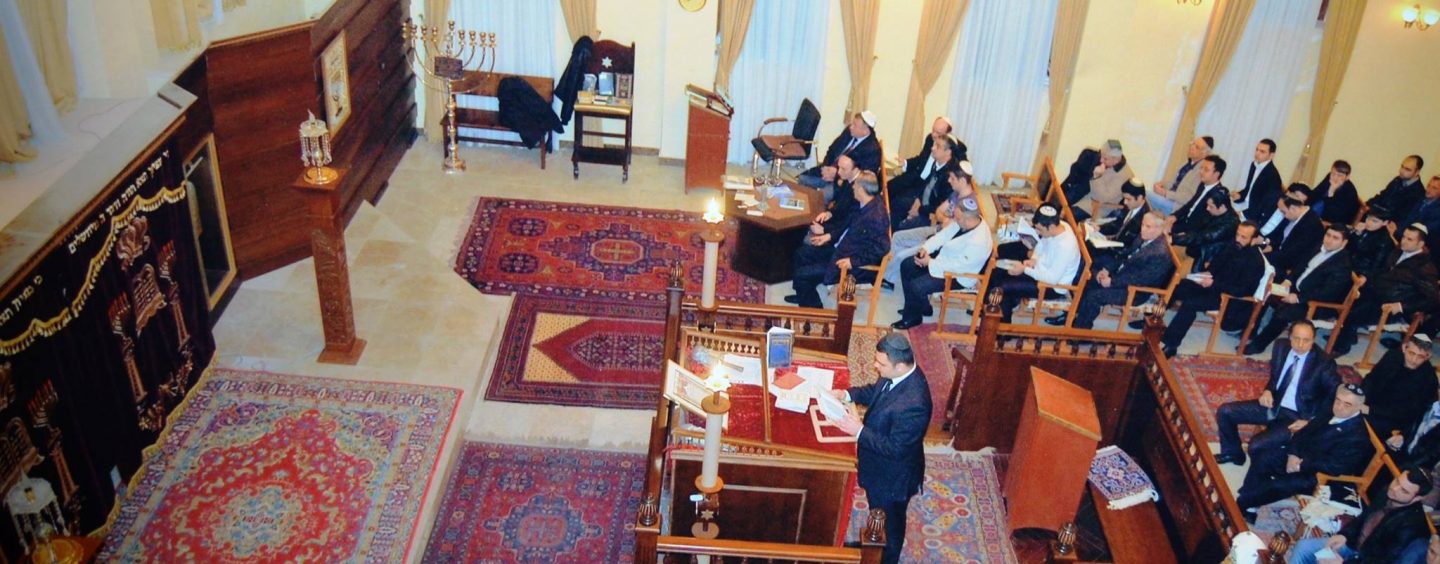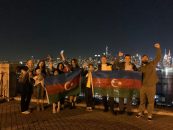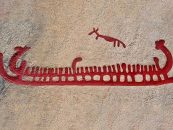By Moses Becker, researcher at the Institute for Human Rights of the National Academy of Sciences of Azerbaijan.
Historically Azerbaijan has always been at the crossroads of trade routes. Large and small states’ interests have been tied here. On the territory of the Republic was information exchange and dialogue among civilizations flushed from the West and East, North and South. Various religious beliefs confronted with new creeds emerged here and spread from here; these beliefs efficiently absorbed as well as adapted abovementioned creeds to local conditions. Many migrants who have removed here found here the true homeland by adopting some of the customs and culture of the indigenous population, while maintaining their own identity. Tolerance and ability to find a common language with newcomers could rally together carriers of various traditions and outlooks. Any religious trend which got into “the land of fires” efficiently was absorbed under local conditions, losing at the same time the aggressiveness and radicalism. Each new outlook absorbed in itself the previous dogmas, creating at the same time absolutely unique combination of ethical and moral standards, philosophies and mentalities. A religious fanaticism and its derivatives – national or racial hatred – have never presented here. A man was assessed and has been subject to view not by his religion, language or nationality, but by moral and ethical qualities of this person. Just here the East and West were able to join together and create a completely new culture and philosophy.
Currently, the Republic of Azerbaijan is more adapted to global processes of integration and globalization. As in the times of the Great Silk Road, our country again is of particular importance by a reason of its unique geopolitical position.
Therefore, it is very important for us to study the absorption of past experience of different nationalities that to this day, many centuries later, continue to live on the land of Azerbaijan, becoming an integral part of such society like “Azerbaijani people”. The most characteristic phenomenon of the last centuries was a very successful and perfectly natural integration of Jewish community into Azerbaijan. In our opinion, when representatives of the non-titular nation are actively involved in the political life of their country of residence, therefore they indeed realized themselves as an integral part of the new community, the benefit of which they are eager to part with their expertise.
In Azerbaijan, the emancipation of the Jews and their integration occurred constantly. Suffice it to say that the Jews living in the Podgornaya or Jewish (Red) Quarter enjoyed all the rights of religious and cultural autonomy and had its own elected body in the 18th Century during the period of the Guba Khanate. Many researchers have also noted the same point. Thus, according to Mordechai Glick, the correspondent of the “Ha Tsafira” newspaper, position of Russian Jews in Azerbaijan has been quite safe. “They have successfully advanced in life, rooted and entrenched in society and have accumulated a wealth of worthy calm carefree life. Many of them were artisans, stonecutter, factory workers, watchmakers, tailors, weavers, jewelers. They’ve become full-fledged citizens of the country.”
Mr. Rice, famous researcher of works made by author of “Ali and Nino” Nussbaum (Said Bey), specified that under the influence of the local Azerbaijani population representatives of the Christian peoples of the Russian Empire, who migrated to Azerbaijan, lost here anti-Semitism inspired since childhood. To suffice it to say that, in spite of existing in the Russian empire percentage related to the reception of the Jewish children in schools, gymnasia and higher educational establishments in Azerbaijan these discriminatory laws some wise managed to get around. Thus, according to the “Circular of the Ministry of Education on July 10, 1887 the school districts’ rulers were offered to make an order that since the beginning of 1887/8 academic year the children of Jews were being accepted in secondary schools of the Ministry of: in the areas located within the boundaries of a permanent residence of Jews in an amount of 10% , in the areas outside of the lines – 5%, and 3% of total students subject to be accepted at the beginning of every school year. “
Nevertheless, we managed to find out that within 1896/7 academic year, “The number of students habitants of Baku and Baku province was 496 persons, 49 of which according to the column “Distribution of students by nationality and religion” turned out to be Jews, which is close to the standards of ” Jewish sedentary boundary”. And next event could occur only in Azerbaijan. “below mentioned was published on September 6, 1908 in “Kaspiy” the newspaper under the heading “Local Chronicle”: “We are told that by the order of the Caucasian school district Trustee Jewish girls who graduated this year seven classes of Mariinskaya High School, will not be accepted for the eighth class for percentage excess in this school. ” However, the pragmatic considerations prevailed, and 10 September, the same newspaper reported that “The heads of the Mariinsky female grammar school initiated a request for approval for admission to the 8th grade Jewish people who have graduated from the course of seven classes in the same school.”
In addition, Azerbaijan has paid strictly careful attention required to respect the basic rights of religious minorities respect. Albeit, Orthodox Church as the dominant enjoyed more privileges. Although, the Jewish community, with the support made by the indigenous population elite practically did not perceive special restrictions. For example, ” at the request of representatives Jews of living at that time in Baku, Baku City Council yielded to them on rights for the leasing use plot of land at the corner of Torgovaya and the Caspian streets to build there a house of worship with a pay in ten kopecks per a year for square fathom renewable the lease term on the same terms. Now, the economic board has the honor to request Your Excellency to apply to the Baku City Council of the designated site transfer of ownership of the Baku Jewish community, as the nullity of rents assigned by Duma indicates that having allocated land for a house of worship, the Duma did not look at it from the point of view of benefiting as this fee is much less than the ordinary charges for land related to this area. “
In 1920, when Azerbaijan became part of the Soviet Union, Jews have held prominent positions in government bodies, as well as in education, health care, science and culture. Grobstein S., M. Robiner, M. Gaiman, I. Glickman, A. Zadov, A. and V. Barudin and V. Zeide made significant contributions in the development of oil refining and petrochemical industry, as well as petroleum engineering”. The Jews played a special role in chess schools’ formation and development in Azerbaijan. Masters of sports and grandmasters on chess were L. Goldin, L. Listengarten, A. Margules, O. Privratsky, E. Glaz, R.Karsunskiy, M. Shur, V. Smolenskaya, E. Sutovsky, T. Gorbuleva, Zatulovskaya T., T. Olshvang, V. Smolenskaya. One of the greatest physicists of the twentieth century, Nobel Prize winner, Hero of Socialist Labor, academician of the USSR L. Landau should be noted among notable scientists.
Since gaining independence for the second time in 1991, the Republic of Azerbaijan has provided equal rights to all its peoples. In 1995, a new Basic Law was adopted. “Heydar Aliyev formulated its main principles as follows:” We adhere to the principles of constitutional state construction in the republic, the creation of a democratic, civilized society, human freedom, freedom of conscience, the approval of modern pluralism, multi-party system. “The Constitution of Azerbaijan enshrines the equality of all citizens of the Republic regardless of their national, racial, religious and linguistic identity. On 15 November 1999 the President of Azerbaijan Heydar Aliyev met the heads of Jewish communities and organizations with which he shared his vision of solving problems of national minorities. National leader has noted in particular that “the Jews live for centuries in Azerbaijan and discrimination has never been clashed against them. We know from history that a significant part of the representatives of the Jewish nationality were resettled to Azerbaijan, fleeing the pogroms, and found a shelter here, a place where they could live in peace and not to experience discrimination. It is a feature of our people. However, it is a demonstration of the policy pursued by the independent state of Azerbaijan».
Talking about the tolerance as a way of life and coexistence, National Leader Heydar Aliyev stressed that it was “not just tolerance of religion to each other, but – tolerance to the customs and mores of each other, as well as to tolerance of cultures. As for the cultural toleration, one can’t speak of tolerance. We can talk about love, let’s say, Azerbaijani to Russian culture, Western culture, Jewish culture, and vice versa. I know that the residents of Baku, citizens of Azerbaijan, who went in their time in Israel, created a large “Bakinets” society, as the place where they are singing Azerbaijani songs, there are sounds of Azerbaijani music, mugham. Also, I know that our mugham, our music is much loved in Georgia. This goes far beyond tolerance; it is a friendship of cultures, mutual influence and interaction of cultures”.
The establishment of the Israel society “Bakinets” has become an evidence of Jews integration into the Azerbaijani society and that they’ve become intimate with Azerbaijan. The same society is in the United States. Now, the Jews created it, because they can’t live without Baku, without Azerbaijan. That is why all of us cherish peace and interethnic harmony achieved in recent years, economic progress and stability in political life”.
In the result of a deliberate national policy of Azerbaijan leaders, the Jewish communities, like all other national minorities, have obtained extensive opportunities to participate in political, social and economic life of States. As President of the Republic of Azerbaijan Ilham Aliyev mentioned, “Azerbaijan is Motherland of all the peoples living here. Mountain Jews have lived here for centuries, and the advantage of Azerbaijan includes also this unity. Respect to each other, to the customs, traditions, religion, and mutual way of life, enhances our people, our nation, our state”. Further, the President stressed that “Multiculturalism is a state policy in Azerbaijan. There is no alternative to multiculturalism in the 21st century. Therefore, I believe that the formation of multicultural societies, the promotion of these ideas should be an integral part of the activity of every responsible politician, public figure. Today, human values are the basis of any normal society”.
In my opinion, the experience of many peoples, cultures and faiths’ integration into Azerbaijan can serve as a good example of unobtrusive, very thoughtful and balanced policy in respect to native speakers of other languages, traditions and cultures, what is unfortunately missing in many “civilized” countries and societies.






